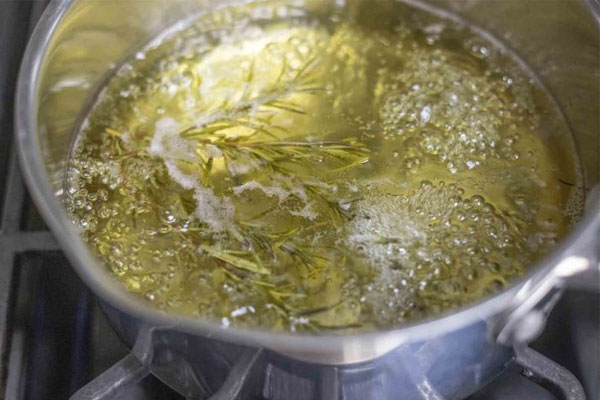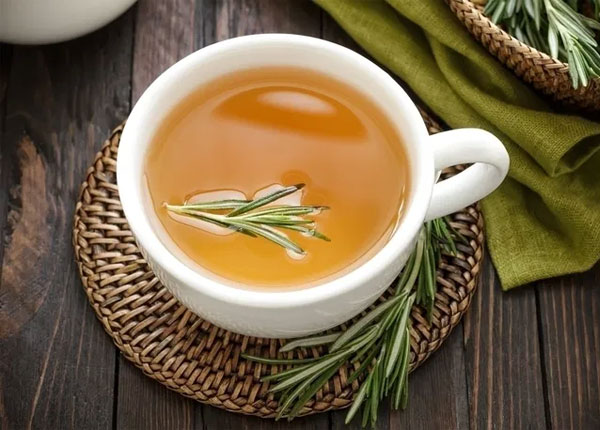Blogs
How long to boil rosemary for tea?
Rosemary tea is a popular herbal infusion known for its refreshing aroma, earthy flavor, and numerous health benefits. Whether enjoyed for relaxation, digestion, or its antioxidant properties, properly preparing rosemary tea is essential to achieving the best taste and nutrient extraction.
One of the most important factors in making rosemary tea is boiling time. If you boil it for too short a time, you may not extract enough flavor or beneficial compounds. On the other hand, overboiling can lead to a bitter taste and potential loss of delicate nutrients.
In this article, we will explore how long you should boil rosemary for tea, what factors affect the boiling time, and the best techniques to ensure a delicious and beneficial cup of rosemary tea.

Factors that affect boiling time
The ideal boiling time for rosemary tea depends on several factors, including the type of rosemary used, the desired strength of the tea, and the purpose of the infusion. Understanding these factors can help you achieve the best balance of flavor, aroma, and health benefits.
Fresh vs. Dried rosemary
- Fresh rosemary contains more natural oils and moisture, requiring a slightly longer boiling time (8–10 minutes) to fully release its flavor and nutrients.
- Dried rosemary has a more concentrated flavor and can be infused more quickly, typically needing 5–8 minutes of simmering.
Desired strength of tea
- Mild tea: Boiling for 5–7 minutes results in a lighter, more subtle flavor.
- Medium-strength tea: Boiling for 8–10 minutes gives a well-balanced taste with noticeable herbal notes.
- Strong infusion: Simmering for 15–20 minutes extracts deeper flavors and more medicinal compounds but may lead to some bitterness.
Purpose of the tea
- For general drinking: A standard boil of 5–10 minutes is sufficient.
- For medicinal benefits: If using rosemary for digestion, relaxation, or anti-inflammatory effects, a longer simmer of 10–15 minutes helps extract more active compounds.
- For stronger herbal remedies: A decoction (boiling for 15–20 minutes) is used for concentrated medicinal benefits but may taste bitter.
Water temperature and cooking method
- Simmering (gentle boil) is the best method to extract rosemary’s essential oils without making it overly bitter.
- High heat or rolling boil for too long can destroy delicate antioxidants and create a harsh taste.
Additional ingredients
- If adding lemon, honey, or mint, the boiling time may need slight adjustments to balance the flavors.
- Some ingredients, like honey, should be added after boiling to preserve their benefits.
Recommended boiling times for different preparations
The ideal boiling time for rosemary tea depends on how you plan to enjoy it—whether as a light herbal drink, a stronger medicinal infusion, or part of a cold brew. Here are the recommended boiling times for different preparations:
Standard rosemary tea (Mild to medium strength)
- Boiling time: 5–10 minutes
- Best for: Everyday drinking, relaxation, and mild digestive support.
- Method:
- Bring water to a gentle boil.
- Add fresh or dried rosemary.
- Let it simmer for 5–10 minutes.
- Strain and enjoy warm, with optional honey or lemon.
Strong medicinal infusion
- Boiling time: 15–20 minutes
- Best for: Anti-inflammatory benefits, respiratory relief, and stronger herbal effects.
- Method:
- Bring water to a boil and add rosemary.
- Reduce heat to low and let it simmer for 15–20 minutes.
- Strain and allow it to cool slightly before drinking.
Cold brew rosemary tea
- Steeping time: 6–12 hours (no boiling required)
- Best for: A refreshing, mild herbal tea with a smooth taste.
- Method:
- Place rosemary in a pitcher of cold or room-temperature water.
- Let it steep in the refrigerator for 6–12 hours.
- Strain and serve over ice.
Rosemary tea concentrate (For later use)
- Boiling time: 20–30 minutes
- Best for: Storing for later use or adding to other beverages.
- Method:
- Boil water and add a generous amount of rosemary.
- Let it simmer for 20–30 minutes.
- Strain and store in a sealed container in the refrigerator for up to a week.
Tips for the best rosemary tea
To get the most flavor and health benefits from rosemary tea, follow these tips for the best preparation:
Use fresh, high-quality rosemary
- Choose organic fresh or dried rosemary to avoid pesticides and ensure the best taste.
- If using fresh rosemary, rinse thoroughly and use the leaves and tender stems.
- For dried rosemary, store it in an airtight container away from heat and moisture to preserve its potency.
Adjust the boiling time based on strength
- For a mild tea, simmer for 5–7 minutes.
- For a stronger infusion, boil for 10–15 minutes.
- Avoid overboiling, as it can result in bitterness and loss of delicate compounds.
Use the right water temperature
- Bring water to a gentle boil (around 200°F or 93°C) and then lower the heat to a simmer.
- A rolling boil for too long can make the tea harsh and degrade its nutrients.
Enhance the flavor with other ingredients
- Add honey for natural sweetness.
- Squeeze in some lemon juice to enhance the flavor and increase antioxidant absorption.
- Mix with mint, ginger, or cinnamon for a more complex taste.
Let it steep after boiling
- For a richer taste, cover the pot and let the tea steep for 5–10 minutes after turning off the heat.
- This helps extract more essential oils and nutrients.
Strain well to avoid a bitter taste
- Use a fine mesh strainer or tea infuser to remove rosemary leaves.
- If using dried rosemary, consider using a tea bag or reusable infuser to minimize loose particles.
Store leftover tea properly
- If making a large batch, store leftover rosemary tea in a sealed container in the refrigerator.
- It can last up to 3 days, but for the freshest taste, consume within 24 hours.

Conclusion
Boiling rosemary for tea is a simple and effective way to enjoy its aromatic flavor and health benefits. The ideal boiling time depends on your desired strength, with 5–10 minutes being suitable for a mild tea and 15–20 minutes for a stronger medicinal infusion. To make the best rosemary tea, choose high-quality fresh or dried rosemary, use the right water temperature, and experiment with other ingredients like honey or lemon for added taste.
Following the right brewing techniques, you can maximize the nutritional and therapeutic properties of rosemary tea while avoiding bitterness. Whether you’re drinking it for relaxation, digestion, or overall wellness, properly preparing rosemary tea ensures you get the best results with every cup.
